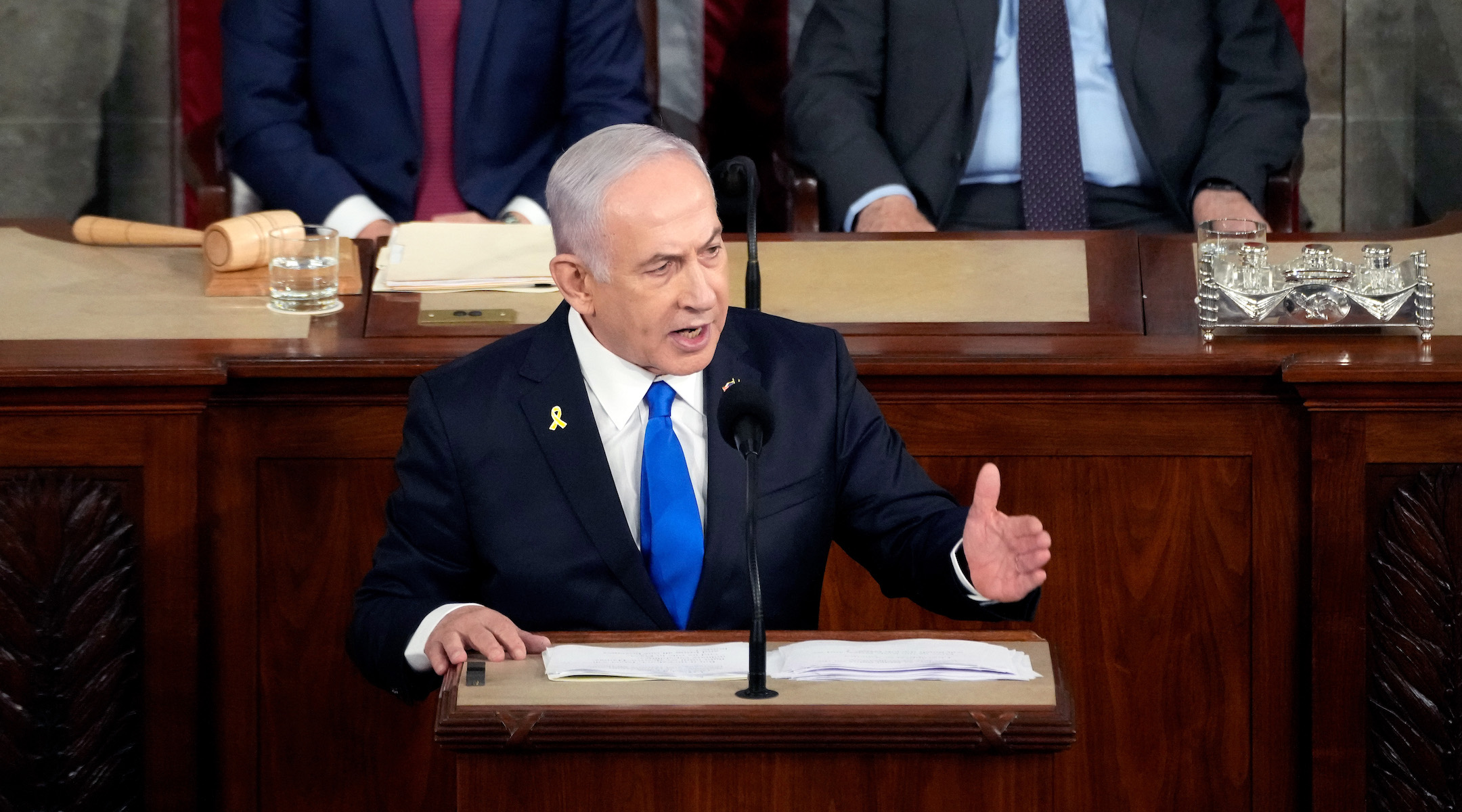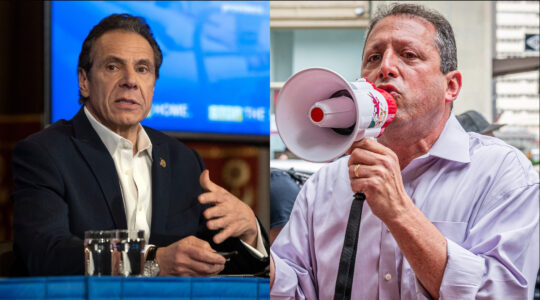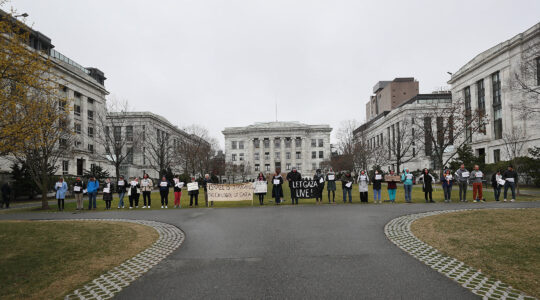In a defiant speech to the U.S. Congress, Benjamin Netanyahu vowed to continue fighting in Gaza until Israel achieves “total victory” over Hamas and, in the face of virulent opposition at home and abroad, argued that the war was a shared fight for democracy.
“We’re not only protecting ourselves, we’re protecting you,” Netanyahu, Israel’s prime minister, said in the speech Wednesday afternoon to a chamber that applauded him dozens of times. “Our enemies are your enemies. Our fight is your fight. And our victory will be your victory.”
The speech, Netanyahu’s fourth to the body, has been surrounded by controversy and came at a time of upheaval both in the United States and Israel. More than nine months into the war that began with Hamas’ Oct. 7 attack on Israel, criticism of Israel’s military campaign, and of Netanyahu specifically, has mounted among Democrats as the death toll in Gaza has risen. In the United States and Israel, pressure has been increasing on Netanyahu to agree to a deal that would release the hostages held by Hamas in exchange for a ceasefire. Families of the hostages have accused Netanyahu of obstructing the deal.
Washington, meanwhile, has been consumed by the upcoming presidential election, the withdrawal of President Joe Biden from the race and the attempted assassination of Donald Trump. Still, thousands of protesters gathered outside the Capitol to protest the speech, including some Israelis who came to demonstrate against Netanyahu in particular.
Some of those protesters made it into the chamber, wearing yellow shirts reading “Seal the deal now.” They were ejected from the speech. Their protest came shortly after family members of the hostages stressed to lawmakers ahead of the speech that making a deal was an urgent priority and that they wanted the prime minister to take it more seriously.
Dozens of Democrats, and at least one Republican, including several leading senators, absented themselves from the speech in protest of Netanyahu. Vice President Kamala Harris and Sen. J.D. Vance, who are on their respective parties’ tickets in November, were away to campaign.
But Rep. Rashida Tlaib, who is Palestinian-American and perhaps the most vociferous opponent of Israel in Congress, stayed in the chamber, sitting silently amid the overwhelmingly friendly response to Netanyahu. She wore a keffiyeh, a Middle Eastern scarf that represents pro-Palestinian sentiment, and held a sign that read “WAR CRIMINAL.”
Netanyahu thanked Biden at length, though he repeated his demand that the United States fast-track weapons to Israel so it could “finish the job” more quickly. He also thanked Trump at length for his Israel policies when he was president. He did not mention Harris, who is the presumptive Democratic nominee and will face Trump in November.
In the speech, Netanyahu vowed to bring the hostages home, though he did not directly discuss the deal on the table — which some families had hoped he would agree to in the speech.
“I will not rest until all their loved ones are home, all of them,” he said. “As we speak, we’re actively engaged in intensive efforts to secure their release. And I’m confident that these efforts can succeed. Some of them are taking place right now.”
He spent longer discussing military operations that have freed a number of hostages, including Noa Argamani, who was in the audience and who Netanyahu spotlighted at length. He also paid tribute to soldiers who had come to witness the speech, and alluded to an incident in which the Israeli military killed three hostages who tried to escape.
He focused much more on pledging to continue the military campaign “until we destroy Hamas’ military capabilities, end its rule in Gaza and bring all our hostages home.” He added, “That’s what total victory means and we will settle for nothing less.”
He discussed details of the massacre on Oct. 7, including one anecdote in which a family with two “babies” hid in a “secret attic” that terrorists infiltrated, murdering the family. He did not say where the incident, which does not appear to have been previously reported, occurred. In Israel and beyond, debate has swirled over the veracity of some of the most gruesome anecdotes from Oct. 7, though the murders of some 1,200 people, including hundreds of civilians of all ages, has been established.
Netanyahu aimed to drive home the idea that the war was in defense of the United States as well, an argument he has long made about Israel’s battles with terror groups on its borders. As in his last speech to the body in 2015 — which was similarly divisive — he placed a heavy focus on Iran, which he mentioned some 20 times and said was an enemy of the United States as well as Israel.
“The mobs in Tehran shout ‘death to Israel’ before they chant ‘death to America.’ For Iran, Israel is first, America is next,” he said. “So when Israel fights Hamas, we’re fighting Iran. When we fight Hezbollah, we’re fighting Iran. When we fight the Houthis, we’re fighting Iran.”
He also mentioned the brief report that the U.S. director of national intelligence put out claiming that Iran was helping orchestrate protests against Israel on American college campuses. His extended condemnation of those protests included lines that seemed ripped from social media discourse about anti-Israel demonstrations, including a quip that a sign reading “Gays for Gaza” would be akin to “chickens for KFC” — a line that some pro-Israel voices have repeated for months online.
One of the most extended cheers came when Netanyahu thanked fraternity brothers at the University of North Carolina for preventing the desecration of an American flag by pro-Palestinian protesters. Members of Congress responded with chants of “USA! USA!”
Netanyahu was light on details of what Gaza would look like after the war, as he has been since the war began, though he repeated his promise that Israel would not settle Gaza though it plans to maintain a military presence there. He said that he envisions a civilian Palestinian government in Gaza that is “demilitarized” and “deradicalized” with the help of “regional partners.”
But he made clear that first, Israel would continue fighting the war.
“No matter how long it takes, no matter how difficult the road ahead, Israel will not relent,” he said. “Israel will not bend. We will defend our land. We will defend our people. We will fight until we achieve victory.”
JTA has documented Jewish history in real-time for over a century. Keep our journalism strong by joining us in supporting independent, award-winning reporting.






